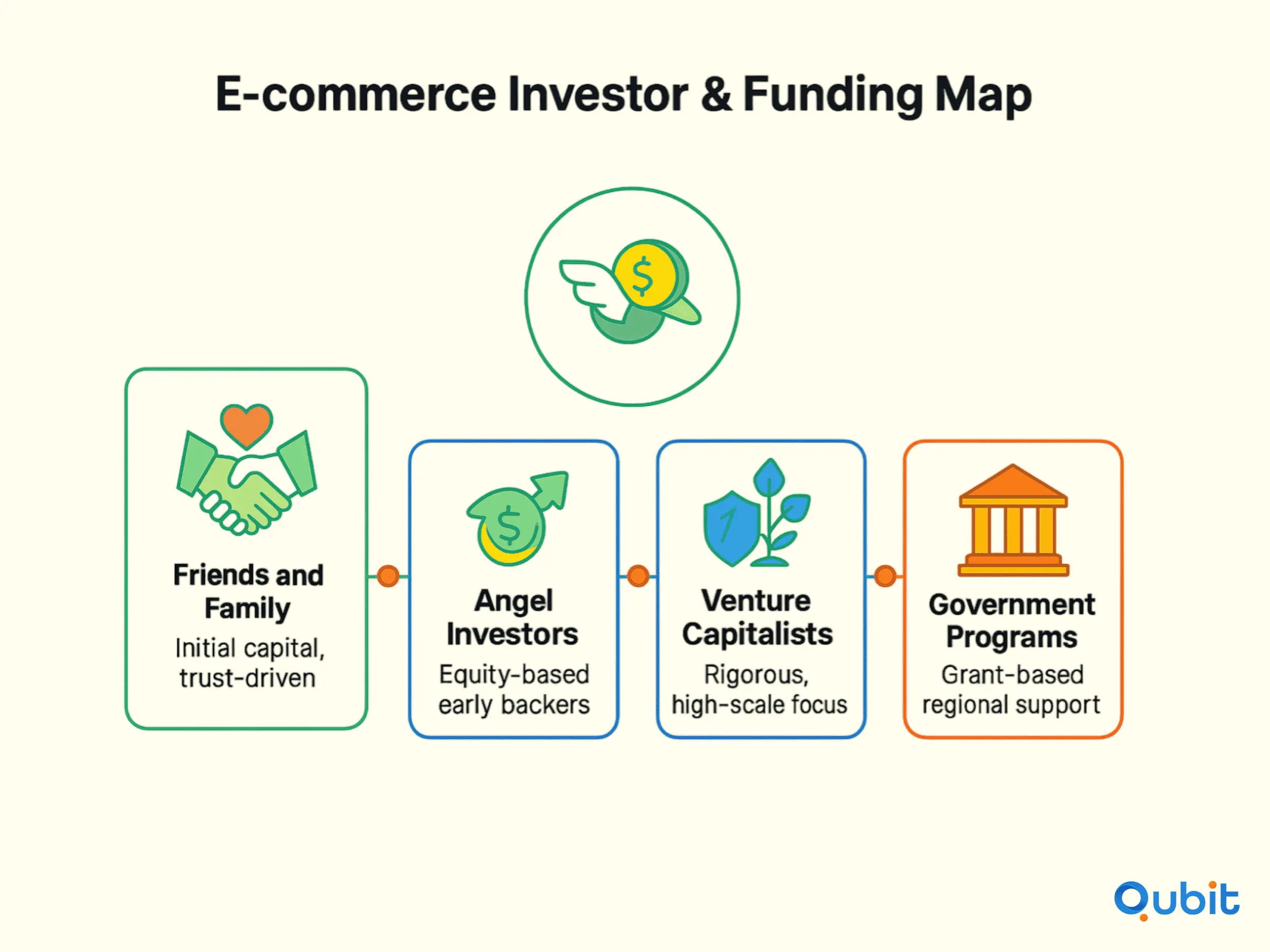Securing funding is one of the most critical steps for e-commerce founders aiming to scale their businesses. The challenge lies not just in obtaining capital but in attracting the right investors who align with your vision and goals.
This blog will equip you with actionable strategies to identify and appeal to investors who can drive your business forward. For broader insights, explore complementary ecommerce startup fundraising strategies. Let’s jump right in.
Understanding the E-Commerce Investment Landscape
Why E-Commerce Attracts Investors
E-commerce continues to be a magnet for investment. In Q3 of 2020 alone, $2.6 billion in venture capital poured into the U.S. e-commerce sector, signaling strong investor confidence in the industry’s growth trajectory. The global shift toward digital retail, accelerated by changing consumer habits, has made e-commerce one of the most dynamic and scalable startup sectors.
Primary Types of E-Commerce Investors
| Investor Type | Typical Stage | What They Offer | What They Seek |
|---|---|---|---|
| Angel Investors | Early-stage | Seed capital, mentorship, industry connections | Equity, high growth potential |
| Venture Capital Firms | Growth/scale-up | Large capital, strategic guidance, rapid scaling | Significant equity, scalability |
| Private Equity | Established brands | Operational expertise, large funding | Strong ROI, exit within few years |
| Strategic Investors | Any (often later) | Industry expertise, supply chain, distribution | Synergy, market expansion |
| Crowdfunding/Platforms | Early-stage | Validation, community funding | Product-market fit, early traction |
Key Factors Investors Consider in E-Commerce Startups
1. Market Size and Scalability
Investors are drawn to startups targeting large, untapped markets with clear potential for rapid growth. Demonstrating how your business can scale—through technology, logistics, or product expansion, is crucial.
2. Unique Value Proposition (UVP)
With competition fierce, your UVP must be clear and compelling. Explain how your product or service solves a specific customer pain point and what differentiates you from others in the market.
3. Team and Execution Capability
A strong, experienced founding team is often as important as the business idea itself. Investors look for teams with complementary skills, industry knowledge, and a track record of execution.
4. Traction and Milestones
Showcasing real progress—such as revenue growth, user acquisition, partnerships, or product development milestones, demonstrates momentum and reduces perceived risk for investors.
5. Financials and Path to Profitability
Clear financial projections, understanding of key metrics (like customer acquisition cost vs. lifetime value), and a roadmap to profitability are essential. Investors want evidence of a sustainable business model.
How to Find the Right Investors
1. Define Your Investment Needs
Before seeking investors, clarify:
- How much capital you need
- What you’ll use it for (marketing, inventory, tech, etc.)
- What kind of investor support you want (mentorship, industry connections, etc.)
- How much equity you’re willing to offer
2. Identify Investor Types That Fit Your Stage
- Pre-seed/Seed: Angel investors, crowdfunding
- Growth/Series A+: Venture capital firms, strategic investors
- Expansion/Later stage: Private equity, larger strategic investors.
3. Research and Target Investors
- Look for investors who have funded similar e-commerce or tech startups.
- Use databases like AngelList, Crunchbase, and LinkedIn to identify potential backers.
- Attend networking events, industry conferences, and startup competitions to meet investors in person.
4. Leverage Warm Introductions
Personal recommendations and introductions from trusted sources (advisors, other founders, industry professionals) significantly increase your chances of securing investor meetings.
Types of Investors and Funding Sources
E-commerce founders have access to a diverse range of funding options, each tailored to different stages of business growth. Below is a breakdown of the primary investor types:

1. Friends and Family Funding
Early-stage entrepreneurs often turn to friends and family for initial capital. This informal funding source is ideal for covering basic operational costs and testing product-market fit. While less structured than institutional funding, it requires clear communication and transparency to maintain trust.
2. Angel Investors
Angel investors are individuals who provide capital to start-ups in exchange for equity. They often focus on early-stage businesses with high growth potential. For founders seeking angel investors, exploring resources like the ecommerce angel investors list can offer valuable insights into identifying and approaching these backers.
3. Venture Capitalists (VCs)
Venture capital firms typically invest in businesses with proven scalability and robust revenue models. However, less than 1% of start-ups secure venture capital, making it crucial for founders to demonstrate a unique competitive advantage and operational excellence. For those interested in exploring VC opportunities, the top ecommerce VC firms 2025 provide a detailed overview of firms actively investing in e-commerce.
4. Alternative Funding Sources
Alternative funding avenues, such as crowdfunding platforms and revenue-based financing, are gaining traction among e-commerce start-ups. These options offer flexibility and often require less stringent criteria compared to traditional investors.
5. Government Programs
Government initiatives, like the Rural Business Development Grants, support e-commerce businesses in underserved regions. These programs can be instrumental in driving growth while fostering economic development.
Key Considerations for Attracting Investors
Investors evaluate start-ups based on several critical factors. Understanding and addressing these considerations can significantly enhance your chances of securing funding:
Competitive Advantage
A unique competitive edge is vital for standing out in the crowded e-commerce market. Whether it’s an innovative product, exceptional customer experience, or proprietary technology, showcasing what sets your business apart is crucial.
Operational Efficiency
Investors value businesses with streamlined operations and scalable processes. Demonstrating operational excellence, such as efficient supply chain management and cost-effective fulfillment strategies—can instill confidence in your ability to sustain growth.
Modern Technology Adoption
Adopting cutting-edge technology is a key driver of success in e-commerce. For example, DeBra's Platform Transformation illustrates how implementing BigCommerce with a virtual fitting service resulted in a 215% revenue increase and 627% customer growth. This case study highlights the importance of leveraging technology to enhance customer engagement and boost profitability.
The Importance of Diversifying Funding Strategies
Given the limited allocation of venture capital to e-commerce start-ups, founders must explore multiple funding avenues. Diversifying your strategy not only increases your chances of securing capital but also reduces dependency on a single source.
Effective Funding Strategies and Capital Utilization
Investors are increasingly drawn to businesses that present a clear, data-driven value proposition and demonstrate how capital will be utilized to drive growth. This section explores actionable funding strategies, emphasizing diversification, structured outreach, and optimized internal operations to inspire investor confidence.
1. Validate Your Value Proposition with Market Research
A strong value proposition is the cornerstone of any successful funding strategy. Investors want assurance that your product or service addresses a genuine market need. Backing your claims with solid market research is essential.
For instance, citing statistics like “Global eCommerce sales projected to reach $6.3 trillion in 2024 and $7.4 trillion in 2025” can highlight the industry’s growth potential and position your business as a promising investment opportunity. Use such data to demonstrate long-term scalability and relevance in your pitch.
2. Present Clear Capital Allocation Plans
Transparency in capital utilization is a key factor in gaining investor trust. Break down how funds will be allocated across critical areas such as product development, marketing, and operational scaling. A detailed plan not only reassures investors but also showcases your ability to manage resources effectively.
For example, Shop Circle’s Series A funding success, raising $120 million to scale e-commerce software solutions, was largely attributed to their clear vision and demonstrated market traction, achieving 360% year-over-year growth.
3. Diversify Funding Sources
Relying on a single funding channel can limit your opportunities and increase risk. Diversifying your funding sources—such as angel investors, crowdfunding platforms, and non-traditional channels—can broaden your reach and improve your chances of securing investment.
For example, corporate venture arms and strategic retail investors often provide not just capital but also industry expertise and connections. An analysis found in retail corporate venture ecommerce investment details how these investors engage with e-commerce startups, aligning with broader diversification strategies.
4. Optimize Internal Operations
Streamlined operations signal to investors that your business is ready for scalable growth. Efficient processes, robust financial management, and a clear organizational structure demonstrate your ability to handle increased capital responsibly. Combining operational excellence with digital outreach strategies—such as targeted campaigns on search engines and social media—can further enhance investor confidence.
5. Structure Your Outreach
A well-organized investor pipeline is crucial for effective fundraising. Identifying potential investors, tailoring pitches to their interests, and maintaining consistent communication can significantly improve your chances of securing funding. A walkthrough presented in investor pipeline ecommerce startup explains how to structure and manage investor relationships, providing a detailed viewpoint that adds depth to your fundraising strategy.
6. Leverage Accelerators and Incubators
Accelerators and incubators can be invaluable for e-commerce founders, offering not just funding but also mentorship, networking opportunities, and operational support. A review of ecommerce accelerators incubators outlines their role in nurturing startups, making them a critical component of your funding strategy.
How to Look for the Right Investor For Your Startup?
| Category | What to Look For | Why It Matters | Red Flags to Watch For |
|---|---|---|---|
| Industry Experience | Investors who understand e-commerce and your market | They can provide valuable guidance, insights, and relevant connections. | Lack of relevant experience or network |
| Network | Access to potential partners, customers, and future funding rounds | A strong network can accelerate growth and open new opportunities. | Limited or no network |
| Strategic Alignment | Investment philosophy and expectations match your vision for growth | Ensures long-term partnership and avoids conflicts over direction. | Misalignment of values or business vision |
| Support Level | Determine if the investor is hands-on or passive, as per your needs | The right support level can help you overcome challenges and scale faster. | Overly aggressive terms or demands for control |
Conclusion
Securing funding for your e-commerce startup requires a blend of strategic planning and precise execution. From identifying the right investors to crafting compelling pitches, the strategies outlined in this blog emphasize the importance of a structured approach. A data-driven methodology not only strengthens your pitch but also demonstrates your commitment to informed decision-making.
Equally vital is presenting a well-organized operational and financial plan, which instills confidence in potential investors. By focusing on clarity and preparation, you can effectively communicate your vision and business potential.
If you’re ready to secure the capital for your e-commerce startup, we at Qubit Capital are here to help with our ecommerce fundraising assistance. Get in touch to accelerate your growth and turn your vision into reality.
Key Takeaways
- Diversify your funding strategies to align with your startup’s growth stage.
- Embrace emerging trends like data-driven debt funding and AI personalization.
- Prioritize robust financial metrics such as LTV/CAC and unit economics.
- Develop a compelling pitch deck backed by clear, transparent financial data.
- Leverage actionable case studies and proven success stories to build investor confidence.
Frequently asked Questions
How to attract investors to an e-commerce business?
Connecting with investors begins with thorough research. Explore dedicated investor platforms and attend networking events tailored to startups. Social media channels and online tools can also help you identify and reach out to potential investors effectively.






